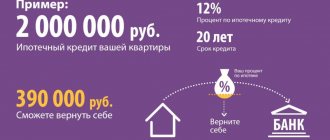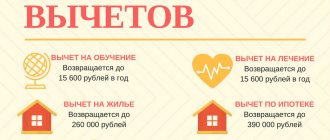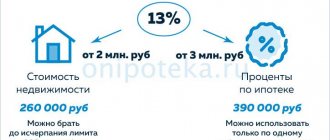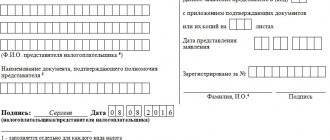Are sales transactions taxable?
Value added tax is not always paid when buying and selling real estate. Speaking about VAT, it should be understood that it is calculated, and therefore subject to reimbursement, only on transactions in which one or both parties are legal entities. Individuals pay personal income tax only if the sale of the premises is carried out within the first five years after acquiring ownership of the property.
Residential real estate transactions:
- VAT is subject to VAT if a residential building is sold that has not been put into operation.
- Not subject to VAT on the sale of completed objects - apartments, rooms, houses, shares in premises.
When buying and selling commercial real estate, VAT is paid on the amount received from the sale.
In the Russian Federation, the VAT rate from January 1, 2019 is 20%. Depending on the situation, it can be calculated from profit or revenue.
The myth about VAT refund after purchasing real estate - is there any real basis?
VAT refund for legal entities is possible , this happens by preparing reports in the form of accounting books, invoices and financial statements, which are submitted to the tax authority.
VAT refund by legal entities when purchasing real estate is also expected, but this applies only to commercial non-residential real estate if the real estate acts as a product of clause 3 of Article 38 of the Tax Code of the Russian Federation and is subject to Articles 146, 154, 164 of the Tax Code of the Russian Federation as an object of taxation VAT.
If an organization has acquired non-residential real estate for its subsequent sale, then it pays VAT on the entire transaction amount (both upon purchase and subsequent sale) and income tax on actual profit. In such a situation, the organization has the right to claim a deduction for the “input” VAT that it paid when purchasing real estate.
The purchase and sale of residential real estate by a legal entity is not subject to value added tax. When buying and selling, only income tax is paid. This is quite simple to explain - the organization acquired residential property, but did not produce it, so there can be no talk of any added value.
Perhaps it was these nuances of tax calculation and exemption that gave rise to the common myth about VAT refunds. This is not possible for individuals.
Who pays and when?
In accordance with Chapter 21 of the Tax Code of the Russian Federation, payment of VAT is assigned to the seller in cases where ownership rights to the goods sold are transferred . When selling real estate, the fact of the transaction is secured by an agreement on the transfer of rights, which is registered in Rosreestr. The costs of paying value added tax are borne by the party that received funds for the sale of the object.
As for the deadline for paying VAT, there are often many disagreements with it. The difficulty lies in the fact that, according to the law, ownership rights arise only at the time of state registration of the purchase and sale transaction.
In fact, the transition date is recognized as the day when the corresponding entry is made in the Unified State Register. But the final registration procedure takes a lot of time, sometimes up to several months. At the same time, the accountant faces a dilemma when exactly to make calculations and transfers.
To resolve the dispute, an additional clause 16 was added to Article 167 of the Tax Code of the Russian Federation. It contains clear instructions that the tax calculation date is the day of bilateral signing of the transfer deed for the property.
Grounds and conditions for personal income tax refund
Taxpayers who are obligated to pay income tax - personal income tax - have the right to receive a property deduction. When making a number of transactions, including when buying an apartment, they can reduce the amount of their income, from which this tax is calculated. for the amount of expenses incurred.
Costs for the purchase and construction of housing that reduce the tax base may be included in accordance with Art. 220 of the Tax Code of the Russian Federation the following expense items:
- For the purchase of a residential building, including at the stage of unfinished construction;
- For the development of estimate and design documentation;
- For infrastructure – connection to utility networks and installation or creation of autonomous communications;
- For the purchase of finishing and building materials;
- To pay for construction and finishing works of the facility;
- To acquire rights to equity participation in a new building.
At what point should I take it for deduction?
The Tax Code of the Russian Federation provides for the possibility of reducing the tax base by the amount of tax deduction established by law. You can receive a deduction only if you follow a number of rules :
- The purchased object is used for operations that are subject to VAT.
- The buyer has an invoice from the seller.
- The purchased property is included in the organization's accounting records.
If the required conditions are met, only one question arises when the calculation can be made. The VAT tax deduction is theoretically also applicable from the date of actual transfer of rights, but the opinions of different departments on this issue are divided:
- The Ministry of Finance believes that it is necessary to deduct VAT only after the object has been placed on the balance sheet of the enterprise, that is, after entering information into the Unified State Register of Real Estate.
- The courts take a different point of view and believe that it can be resorted to after the funds for the property have been transferred.
The last paragraph of the requirements for the use of a tax deduction indicates that it can be applied no earlier than the property right is registered in the Unified State Register of Real Estate.
What documents are required to obtain a property deduction?
To return personal income tax, you need to prepare a substantial package of documents.
- Agreement on the purchase of residential real estate and a copy thereof. Remember, according to the conditions stipulated by law, you have the right to receive a deduction for a maximum amount of 2 million rubles.
- Acceptance and transfer certificate signed by the co-owner of the property.
- Scans of payment documents, which are confirmation of payments made by the citizen requiring the deduction. These could be: receipts;
- bank statements;
- checks;
- acts on the acquisition of construction materials;
- other documents.
Don’t know how to fill out forms 2-NDFL and 3-NDFL ? You can familiarize yourself with these topics on our portal. Step-by-step instructions, sample forms, and how to avoid basic mistakes when filling out a declaration.
Accounting
Paragraph 1 of Article 167 of the Tax Code of the Russian Federation establishes the deadlines for calculating the tax base. They are determined for real estate according to the following parameters:
- Time of transfer of rights to real estate.
- Payment of full or partial amount of funds for the future transfer of rights.
The day that comes earlier in time is taken into account for calculation. It is important that an invoice is issued within the first five days after payment or transfer of the buyer's rights.
At the moment of transfer of ownership of the object, the seller writes it off from the “Fixed Assets” account, and the buyer puts it on his balance sheet. Accrual of depreciation payments stops on the 1st day of the month following the period of actual transfer.
Return Policy
The tax legislation of the Russian Federation gives a hypothetical right to receive a property deduction to any taxpayer. Both individuals and legal entities can take advantage of the deduction, subject to a number of conditions.
The state reimburses previously collected taxes in the form of:
- Personal income tax, if we are talking about individuals.
- VAT for legal entities.
You can use the granted privilege by performing a number of required actions.
Is reimbursement possible for individuals?
For individuals, there is no such thing as a VAT refund when registering the purchase and sale of real estate. VAT is not calculated or collected from citizens who do not have legal status. They pay personal income tax of 13% (for residents) and 30% (for non-residents).
When purchasing housing, an individual has the right to return the personal income tax paid over the last two years, but not more than the maximum established amount. In accordance with the Tax Code of the Russian Federation, citizens can get back :
- Personal income tax on 2 million rubles spent on the purchase of property.
- Personal income tax on 3 million rubles, which were accrued as interest for the use of mortgage funds.
The benefit is available only to those persons who have officially worked for the last two years and paid taxes to the budget.
Features of calculation by legal organizations
A legal entity will receive a VAT refund if the following conditions are met:
- There is documentary evidence of the transaction. An invoice, acceptance certificate, purchase and sale agreement, etc. are provided.
- The transaction is real and was carried out exclusively for use in business activities and making a profit.
- The goods have been capitalized, that is, the property has been accepted into balance sheet account 01 “Fixed Assets”.
- The transaction has no dark spots along the entire process of execution, including counterparty links.
To receive a VAT refund, you must meet all the stated criteria at once.
VAT refund when purchasing an apartment
Before applying for a VAT refund when purchasing an apartment, it is recommended that you familiarize yourself with the basic concepts. Reimbursement of value added tax - refund of the fee to an individual entrepreneur or organization. This tax has nothing to do with the purchase of an apartment or other real estate.
The question of how to return VAT on the purchase of an apartment is not correct. When purchasing real estate, there is a return of personal income tax - deductions on the income of individuals.
This fee is deducted from the employee’s salary and is retained by the accounting department at the payer’s place of work. A person receives payment for his work after deducting a contribution to the budget. A deduction from contributions is the amount by which the personal income tax tax base is reduced. The return of the deduction money, or compensation for the purchase of housing, is the amount that is given to the applicant. It is 13% of the deduction.
When can you apply for a deduction:
- The person is a taxpayer.
- The following types of property are purchased - apartment, house, shared ownership.
- The right to purchase has been registered.
- The apartment was purchased with my own money or with a targeted loan from a Russian financial institution.
It is impossible to receive compensation if deductions are not made to the budget of the Russian Federation, the person works unofficially. Not all types of real estate can be refunded; a refund is not possible when purchasing a plot of land without buildings and a garage. Before registering the property, it is impossible to register a deduction. You cannot receive a refund if the housing was purchased with social support funds, for example, maternity capital.
When renting a home from a developer without renovation, it is necessary to reflect this fact in the documents, only then is it possible to receive compensation for the costs of repair work.
A popular question is how many times a refund can be issued. If you purchase a home before the end of 2013 and apply for a refund, you cannot apply for a deduction again when purchasing a new home. If the right was registered after this period, the return may be repeated until the deduction limit is exhausted, which is two million rubles.
The largest deduction amount is 2 million, and the return is 13% of the amount of the indicator, that is, up to 260 thousand. The final figure is set taking into account actual expenses, but cannot exceed the permissible limit.
Procedure
The procedure for VAT refund is regulated by Art. 176 Tax Code of the Russian Federation . It involves the following steps:
- Collecting a package of documents that will confirm the need for a refund. It primarily includes an invoice, as well as a purchase and sale agreement, payment certificates and an extract from the sales and purchase books.
- Entering data into the tax return. It contains information about the full cost of the purchased property, and also provides a calculation of the amount of VAT to be refunded.
- Submitting papers to the Federal Tax Service.
The following steps are taken by the tax authority:
- A desk verification of the declared information is carried out. Three months are allotted for its implementation.
- Based on the results of the inspection, a decision is made to return the funds or refuse it.
- The taxpayer is sent a corresponding written notice. If any violations are identified, the taxpayer is given 30 days to eliminate them and challenge the refusal to refund.
- The refunded amount is transferred to the recipient's account.
The money is transferred within five days from the moment the decision on VAT refund is made.
Features of purchasing an apartment by a legal entity
Russian legislation does not allow a ban on the purchase of apartments by a legal entity, unless otherwise provided by the constituent documents of the company itself. When purchasing an apartment by a legal entity, two options are allowed:
- when an apartment is purchased from another individual;
- when an apartment is purchased from a legal entity.
Any commercial organization in the status of LLC, JSC and CJSC can act as a legal entity. An apartment can be purchased by a company for two main purposes:
- to use it in your commercial activities, then it will act as a fixed asset, and appropriate accounting records must be maintained;
- for use for investment purposes for further resale and profit (with this option, the apartment will not be considered a fixed asset).
When purchasing an apartment by a legal entity, a specific feature of the transaction will be the need to obtain permission from the business owner for a large acquisition. A major transaction is defined as one whose value exceeds 25% of the enterprise’s assets.
Real estate is an expensive asset that requires the diversion of a large sum of money from the enterprise’s turnover and is associated with increased risks for the buyer. In such a situation, the co-owners of the company or its shareholders must express their consent to the signing of the purchase and sale agreement.
Consent must be provided in writing. The form of the document differs depending on the type of ownership: it could be minutes of a meeting, a meeting of shareholders, or a resolution of the board of directors. Concluding a transaction without consent is also permitted. For example, if the sole founder of an LLC is its director.
Otherwise, a purchase and sale transaction involving a legal entity is carried out according to the general algorithm:
- The parties negotiate the essential terms of the purchase and sale of real estate.
- A preliminary purchase and sale agreement is signed and security is paid in the form of an advance or deposit.
- The parties sign the main purchase and sale agreement.
- The seller and buyer go through the procedure of state registration of the transfer of ownership.
- The final payment under the purchase and sale agreement is made.
- An act of acceptance and transfer of real estate is signed.
Difficult issues and bottlenecks
VAT refund, although it is a taxpayer’s right, is often intimidating due to the complexity of the procedure. Of particular concern to legal entities is the desk audit, which is carried out by the Federal Tax Service to establish the legality of the transaction and verify its real value.
To avoid complications, it is important that the seller does not disappear after the sale. The reliability of the selling party, as well as its relationship with the buyer, is checked first . Other factors are also important, for example, whether the seller pays VAT, whether he is authorized to conduct transactions, etc. These difficulties can only be avoided with a careful approach to the acquisition of property.
Another common problem when refunding VAT is confirming the source of income. You should be prepared for the need to collect and provide evidence that the funds spent on the purchase were obtained legally. During the audit, documents will be requested not only for the organization itself, but also for its counterparties.
Payment of VAT on sales and purchases, as well as its reimbursement, depends on a number of factors. Legal entities can reduce their expenses only if a number of legal conditions are met.









